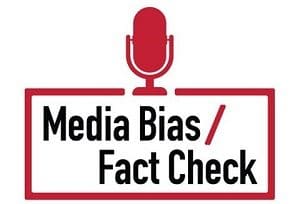RIGHT-CENTER BIAS
These media sources are slightly to moderately conservative in bias. They often publish factual information that utilizes loaded words (wording that attempts to influence an audience by appeals to emotion or stereotypes) to favor conservative causes. These sources are generally trustworthy for information but may require further investigation. See all Right-Center sources.
- Overall, we rate the Nikkei Asian Review Right-Center biased based on story selection and editorial positions that moderately favor the right and High for factual reporting due to a clean fact check record.
Detailed Report
Bias Rating: RIGHT-CENTER
Factual Reporting: HIGH
Country: Japan
MBFC’s Country Freedom Rating: MOSTLY FREE
Media Type: Magazine
Traffic/Popularity: High Traffic
MBFC Credibility Rating: HIGH CREDIBILITY
History
Founded in 2013 by Japanese media corporation Nikkei, Nikkei Asian Review is an English language business journal and website which focuses on news, economy, business, markets, trends, and international affairs across the Asian region. Nikkei Asian Review is headquartered in Tokyo, Japan. Former Financial Times editor Gwen Robinson is Chief Editor of the Nikkei Asian Review. In 2015, Nikkei purchased the Financial Times from Britain’s Pearson, a UK business newspaper, paying $1.3 billion. Thus Nikkei Asian Review became FT’s sister publication. According to their about page, “As content partners, the Nikkei Asian Review and the FT share select articles with their respective audiences and collaborate editorially on joint projects.”
Read our profiles on Japan’s media and government
Funded by / Ownership
Nikkei Inc publishes Nikkei Asian Review. The Nikkei chairman is Tsuneo Kita, and Naotoshi Okada is the President. A complete list of corporate directors can be found here. The Nikkei Asian Review is funded through advertising and subscriptions, in which the subscriber gets full access to articles and analysis as well as to their print magazine.
Analysis / Bias
The Nikkei is known for its conservative views. According to the Japan Times, it is often criticized by “depending too much on leaks — apparently provided by corporate insiders — and the paper is often seen as reluctant to criticize Japanese firms bluntly.” Further, Niemanlab quotes New York Times reporter Hiroko Tabuchi after the Nikkei purchase the FT “Worrying. Nikkei is basically a PR machine for Japanese biz; it initially ignored the 2011 Olympus accounting scandal (which FT broke). Nikkei has also hardly covered the Takata airbag defect; almost no investigative work on that issue whatsoever. Nikkei is Japan Inc.”
When covering news geared towards Southeast Asian countries, Nikkei Asian Review utilizes minimally loaded emotional language such as this: “Prayuth close to securing Thai PM job as king backs senate” and “Japan venture specialist to launch $27m fund for India startups”, however, information is not sourced through hyperlinking.
When covering world news pertaining to the USA, they use loaded language such as this quote from an article that reads, “The Abe-Trump summit in Washington in late April showed how Trump has driven U.S. trade policy into a dead end.” Once again, there is a lack of hyperlinked sourcing.
Failed Fact Checks
- None in the Last 5 years
Overall, we rate the Nikkei Asian Review Right-Center biased based on story selection and editorial positions that moderately favor the right and High for factual reporting due to a clean fact check record. (M. Huitsing 05/14/2019) Updated (11/29/2021)
Source: https://asia.nikkei.com
Last Updated on June 28, 2023 by Media Bias Fact Check
Do you appreciate our work? Please consider one of the following ways to sustain us.
or
Left vs. Right Bias: How we rate the bias of media sources


